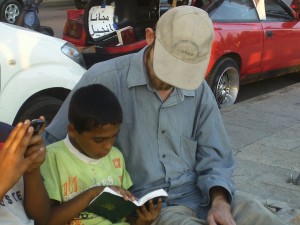Evangelism to unlettered people groups p3: teaching them to read
One idea that probably comes immediately to the mind of a westerner when hearing the word illiterate, “Why not just teach them how to read?”
This site specifically is targeting folks in the Arab World or Middle East North Africa regions. There are many non Arabs in these areas such as the Kurds, Turkmen, Berber, Assyrians, Armenians, Korbati, and others…
Many of these minority groups have been oppressed by the Arabs. The thought of using Arabic to some would be offensive. The Kurds of Iraq are an excellent example of this. If you were to approach them about learning Arabic, many might be upset. They will simply remember Sadaam. The Kurds in Iraq, do have their own language (Sorani Kurdish). That might be better to teach them to read…
 With the Turkmen, I encountered a very big difficulty with this: “What language should I teach them to read in?”
With the Turkmen, I encountered a very big difficulty with this: “What language should I teach them to read in?”
At first, I thought for sure they should just learn Arabic they live in Syria and Lebanon they should know the official language.
I have taught maybe 6 or 8 children how to read. However, I have found generally they do not usually stay focused long enough to learn how to read and Arabic. I pray that there will be some from the group that I have taught thus far that will continue on… However, in the short run it isn’t just a matter of teaching them the letters, they must learn a whole new language.
If you have a group that are simply illiterate Arabs (or a group that has a written language), things will probably be a lot easier for you. The best resource I would recommend getting would be children bibles. I would also suggest getting ones that remain close to the scripture as possible.
I have been using them and then paraphrasing the scripture to make sure they understand. It is taking time, but in the end I think it will be worth it.
For there to be leadership in any Church, I do believe they need to be fully scripture literate.
Without scripture literacy, you can find that they will simply start mixing the different teachings that you have provided with that which other “religious figures” have provided. There is authority with the phrase “it is written!”
I would recommend not trying to teach unbelievers how to read for teaching the Bible, but teaching new believers how to read so that they can be discipled. The new believer has a hunger for the Word, and a driving force to want to know what the Bible really says.
The idea of simply using Bible Stories, without the Bible can become dangerous quickly. When going about trying to setup a Church among the Churchless, we need to make sure there are solid foundations in the Bible. That takes time… We need to build with long term intentions. We want to see trees bearing fruit, with roots reaching deep into the ground, and not just mushrooms that appear over night and are gone the next.
So How to Do it?
First decide the language you are going to teach them. It would be best if you can use their “heart language” however this is not always possible. Using myself as an example; with the Turkmen there exists no Bible translation in their language. And before, everyone starts commenting about Turkmenistan translation, that is a different kind of Turkmen than the Turkmen of the Middle East.
I had a choice, I could use, Turkish, Osmanlica (dead language that is old Turkish), or Azeri. Osmanlica is written in Arabic letters, so I chose it. My goal is teaching / discipling a group of children to be able to read the Bible in both Arabic and Osmanlica, so that they can preach to others and also be able to find better work (as knowing how to read can greatly help improve your chances of getting a good job).
Next, you need to find some people whom you will teach. I have found that children are a lot more likely to learn the letters. Maybe because they are quicker at learning. If you have found something different please share your experience in the comment field bellow.
The next step is to teach letters. I would recommend simply teaching 4 to 6 letters a day. I actually bought these flash cards from Amazon and used them quite a lot. I also made a video game that teaches the letters. You can find my video came at the Learn Arabic section of the site.
Create some kind of incentive to encourage people to learn the letters. For myself, I chose evangecubes; which I will be talking more about in the next article.
Then after they know the letters, start with basic words. Then start having daily bible readings (from stories that are found in children bibles.) Again I would strongly suggest trying to use ones that are closest to the Bible as possible. After reading through one whole children’s bible, the person should come out with a good Bible foundation and also some good vocabulary. Then you could buy another children’s bible and start all over.
Previous parts in the series:
Using stories to share the Gospel to illiterate people
Discipling the illiterate: no shortcuts
Filed under: evangelism